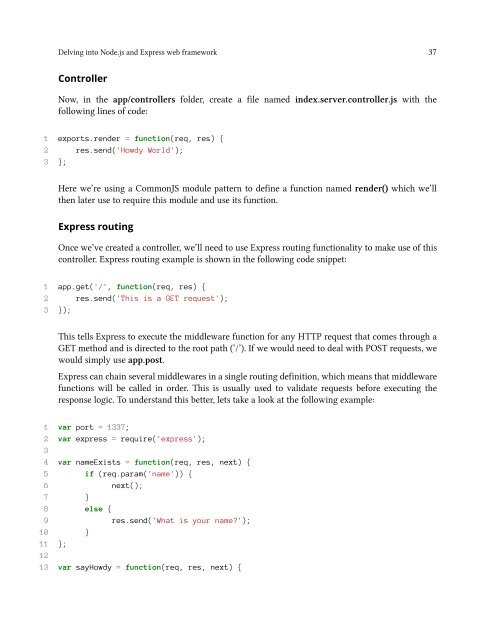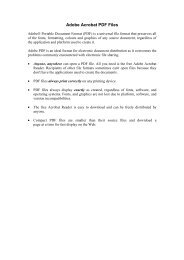Mittwoch, 18. Mai, 2016
Create successful ePaper yourself
Turn your PDF publications into a flip-book with our unique Google optimized e-Paper software.
Delving into Node.js and Express web framework 37<br />
Controller<br />
Now, in the app/controllers folder, create a file named index.server.controller.js with the<br />
following lines of code:<br />
1 exports.render = function(req, res) {<br />
2 res.send('Howdy World');<br />
3 };<br />
Here we’re using a CommonJS module pattern to define a function named render() which we’ll<br />
then later use to require this module and use its function.<br />
Express routing<br />
Once we’ve created a controller, we’ll need to use Express routing functionality to make use of this<br />
controller. Express routing example is shown in the following code snippet:<br />
1 app.get('/', function(req, res) {<br />
2 res.send('This is a GET request');<br />
3 });<br />
This tells Express to execute the middleware function for any HTTP request that comes through a<br />
GET method and is directed to the root path (‘/’). If we would need to deal with POST requests, we<br />
would simply use app.post.<br />
Express can chain several middlewares in a single routing definition, which means that middleware<br />
functions will be called in order. This is usually used to validate requests before executing the<br />
response logic. To understand this better, lets take a look at the following example:<br />
1 var port = 1337;<br />
2 var express = require('express');<br />
3<br />
4 var nameExists = function(req, res, next) {<br />
5 if (req.param('name')) {<br />
6 next();<br />
7 }<br />
8 else {<br />
9 res.send('What is your name?');<br />
10 }<br />
11 };<br />
12<br />
13 var sayHowdy = function(req, res, next) {
















